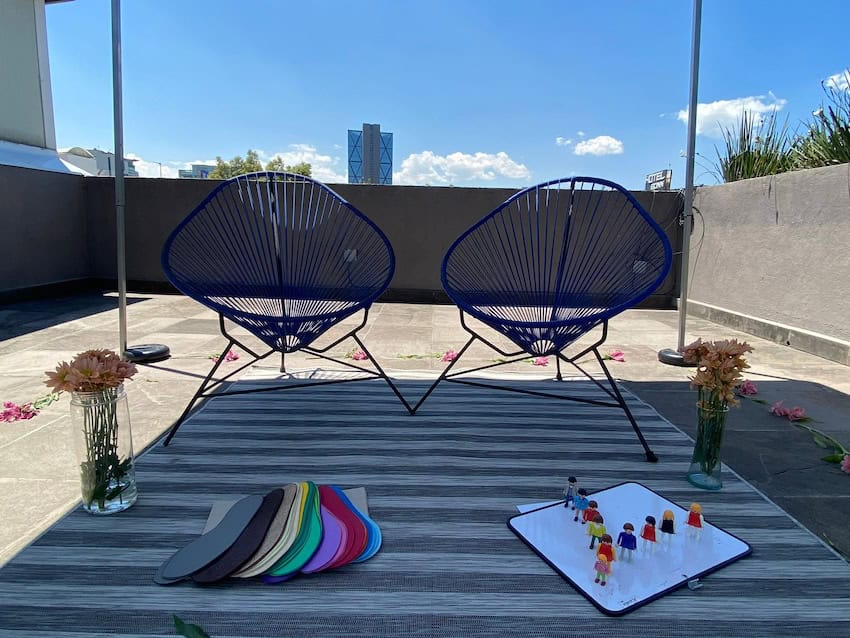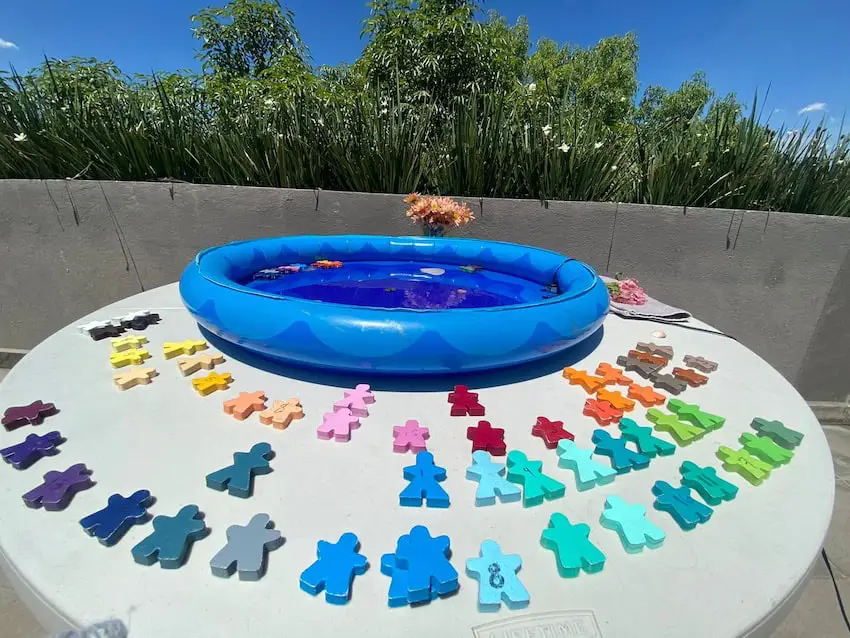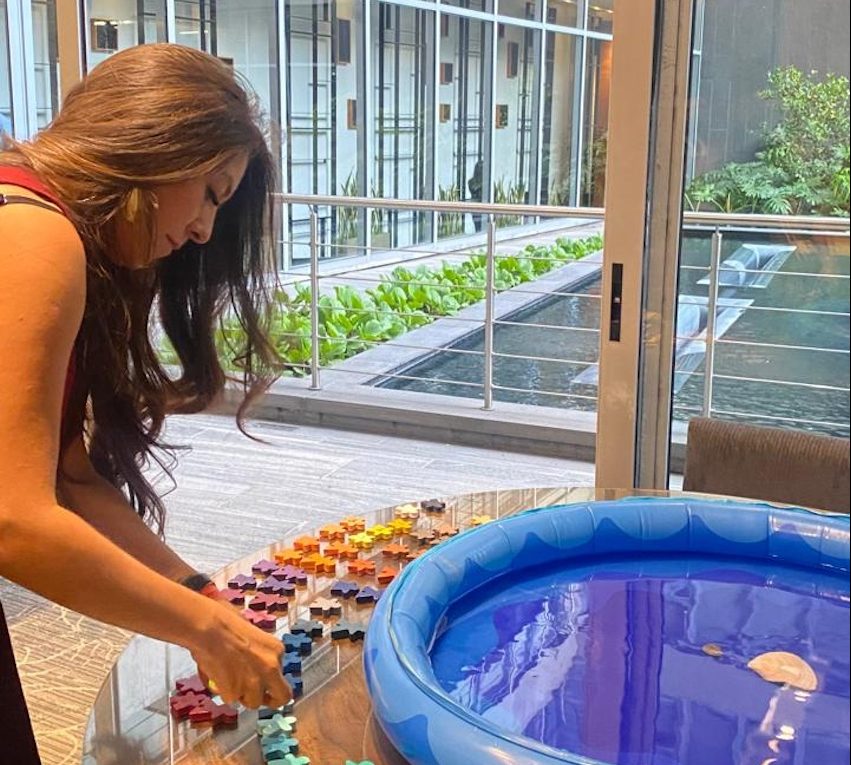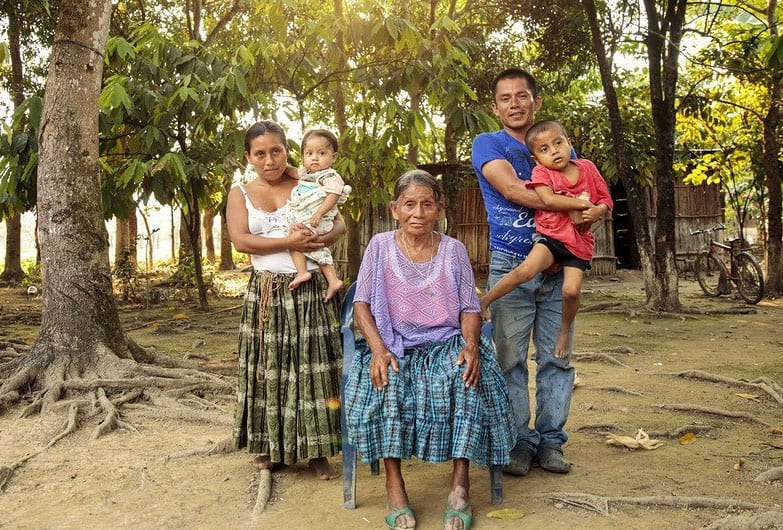“Let’s try something different today,” my therapist suggests as we sit across from one another in his Polanco office in Mexico City. “Have you heard of ‘constelaciones familiares’?” I admit I haven’t, but I’m intrigued. Alvaro is a professorial Mexican therapist, with a modality that swings between deep psychoanalysis, cosmic spirituality, and practical street-smarts. I appreciate the varied techniques he applies to our sessions.
He pulls out a small cloth bag and overturns it. Plain wooden figurines spill onto the table, each a different color but otherwise identical. Seeing my confused look, he scoops them into a pile and slides it over. “Choose one to represent your paternal grandfather,” he says. I pick an orange one.

He has me select different colors for each of my parents, grandparents, great-grandparents, and so on until my extended family is represented. Per Alvaro’s instructions, I also select a white figurine to represent myself, pushing aside the fact that the color projects a cliched image of innocence.
“Now, place them into position with one another.” I consider each character and position each one carefully on the surface of the table.
Over the next hour, we discuss the placement of the figures in relation to one other and to my proxy figure. Alvaro comments on the positioning, asking insightful questions that trigger me, but also prompt novel perspectives. “You’ve rejected your family,” he notes, pointing out my proxy figure’s placement, far from the cluster of the other figures, back turned away.
“I’m not like them,” I protest. “I choose to live differently.”

“You cannot push them away,” he cautions. “ The more you actively exclude something from your life, the more it demands your attention. They’re your ancestors. Face them. Thank them, pay your respects to them, and then ask them for permission to live differently.”
“Ouff,” I exhale, feeling goosebumps rise on my skin. For years I’d rebelled against my family’s rigid expectations of traditional notions of stability and success. In choosing to live abroad, far from the creature comforts and security of a high-level corporate job, I had made myself something of a black sheep.
Alvaro guides me in Spanish to ask for my ancestors’ permission: “Mi familia…pido perdón por rechazarlos…déjenme su bendición para vivir nuevo y diferente. Y así los honro.” (My family… I ask for forgiveness for rejecting you… grant me your blessing to live differently… and this way, I will honor you.)
Tears in my eyes, I leave the office with a sense of lightness and clarity. By rejecting my heritage and my family, I’d unconsciously created tension that both blocked and drained me. To find peace, I needed to honor my roots while living authentically.
Mexico’s growing love affair with family constellations

Since then, I’ve noticed the practice of family constellations is referenced frequently around Mexico. Walking on Avenida Amsterdam in Mexico City a few days after my own experience, I overhear a woman telling a friend about a group constellation session in which she had unpacked her tumultuous relationship with her father. “I’m not angry anymore,” she says in Spanish. “I forgive him.”
In expat and Mexican group chats, there are almost weekly constellation events shared. Most Mexicans I’ve talked to have participated or at least heard of it.
“Oh yes, I’ve even done it with horses,” one Monterrey-based friend tells me. “Horses?” I ask, confused. She explains patiently, “Horses. I went to a ranch outside of the city where we arranged horses as you did with the wooden figures. The facilitator interpreted the horses’ energy and behavior to uncover the family dynamics.”
Fascinating. There’s something about Mexican culture that makes it fertile ground for this practice.
How family constellations work

Our family dynamics, past and present, profoundly shape our lives – as deeply as at the genetic level. Consciously or not, these generational patterns, traumas, and beliefs manifest in our behaviors and worldviews.
Developed by German psychotherapist Bert Hellinger in the 1990s, family constellations allow participants and facilitators to identify the psycho-emotional family legacy influencing their lives. It’s a therapeutic method aimed at resolving conflicts, increasing self-awareness, and promoting change by exploring familial roles and dynamics.
Participants, individually or in groups, use representatives (beings or objects) to symbolically act out family roles, surfacing unconscious attitudes and latent emotions tied to family experiences. This allows for the reinterpretation of dysfunctional family patterns, addressing unresolved emotions, and reconciling past events and relationships.
There are numerous ways to conduct constellations — using figurines, horses, stones, colored footprint cut-outs on the floor, or even objects floating in pools. One facilitator, Diana Garcia, even applies family constellations to corporate settings, conducting sessions with organizational teams in Mexico.
Using footprints, she looks at whether departments are heading in unified directions or getting in each other’s way – are they clustered together or stepping on one another? Are they blocking the company’s goals? Garcia takes the constellation concept to the executive level too, showing owners how workplace dynamics can mirror dysfunctional family patterns playing out subconsciously. “The issues and roles we adopt in our families often get replicated in our professional environments without us realizing it.” She explains.
Mexico’s cultural embrace of family constellations

Mexico’s deep emphasis on family bonds and a cultural openness to alternative healing practices provide fertile ground for Family Constellations. The concept of ancestors is powerful in Mexican culture, as is the multi-generational family unit that extends beyond the nuclear family. In Mexico, the family unit is traditionally viewed as a strong, interconnected network (familias mueganos or “glued” families that are always together) that extends beyond the immediate family to include extended relatives and ancestors.
While this closeness isn’t inherently negative, it can become unhealthy without clear boundaries. Constellations help understand why someone might feel lonely or depressed despite being surrounded by family — because their well-being is intrinsically linked to the overall health of the family system, including past generations’ influences.
Another significant aspect of Mexican culture that aligns with the principles of Family Constellations is the respect for elders and ancestor veneration in Mexican culture. Mexicans are expected to revere ancestors, though this can create dissonance if there is a difficult history or past trauma with any of the familial ancestral parties. Constellations offer a way to process that contradiction without disrespecting the ancestor, by focusing on events, relationships, and “fates” within the family system.
This ancestral reverence is woven into the annual Dia de los Muertos celebration honoring departed loved ones — reinforcing the interconnected, multi-generational view of family that aligns with the principles of Family Constellations and unpacking intergenerational trauma.
Beyond therapy: honoring the past Mexican style
In a culture that celebrates family bonds so fervently, it’s fitting that family constellations have found a home in Mexico’s rich soil, a country where ancient rites illuminate the family ties that both anchor and restrict the soul.
From ranches using horses to embody family roles to boardrooms mapping organizational patterns that mirror household dynamics, constellation work reveals the core energies shaping identity.
For those seeking to untangle generational patterns while staying rooted in reverence, Mexico’s unique cultural context is the perfect setting to alchemize ancestral burdens into blessings through family constellations.
Monica Belot is a writer, researcher, strategist and adjunct professor at Parsons School of Design in New York City, where she teaches in the Strategic Design & Management Program. Splitting her time between NYC and Mexico City, where she resides with her naughty silver labrador puppy Atlas, Monica writes about topics spanning everything from the human experience to travel and design research. Follow her varied scribbles on Medium at https://medium.com/@monicabelot.
